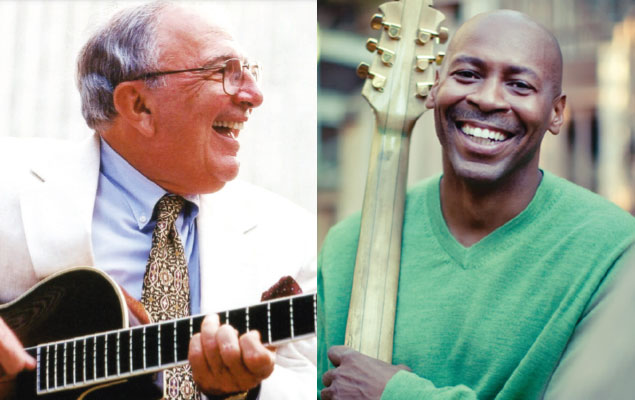
BUCKY PIZZARELLI
JAZZ GUITARIST JOHN “BUCKY” PIZZARELLI BOASTS A musical history that stretches almost as far back as the electric guitar itself. Born January 9, 1926 in Paterson, NJ into a household tradition of Sunday music jams led by his uncles, nine-year-old Bucky first picked up the banjo, then the guitar. By his senior year in high school, he was spending vacations and weekends playing with Vaughn Monroe’s big band. Too young to be drafted at the outset of World War II, Bucky filled guitar chairs left vacant by enlistees, but at 18 went in the service, saw combat in Germany, came home and was shipped to the Philippines. Returning home, the post-war entertainment industry offered opportunities for the young six-stringer.
Bucky learned the ins and outs of every project, absorbing on-the-job experience in arranging, accompanying and recording. He found a position first in radio, then on TV as a staff musician at NBC, joined Skitch Henderson and later the Doc Severinsen Band, playing guitar for The Tonight Show Starring Johnny Carson.
With George Van Eps, Pizzarelli helped redefine the guitar by adding a low A string. More than a decade later, modern virtuosos like Steve Vai and Joe Satriani have popularized that seventh string. Pizzarelli also collaborated with innovator Les Paul to help the guitar carve its own niche in jazz performance. The two lived nearby, and when the local fire department had a party, Les was the big act. Pizzarelli went to listen, and ended up sitting in with him.
By the ’70s, Pizzarelli was touring with his big-band hero Benny Goodman, as well as moving to the front as the leader of his own band, and collaborating with Les Paul. “I played the seven-string and accompanied Les, which he liked because he didn’t need a drummer or a bass player, and it was still complete. Les never picked up a sevenstring, though. He never fooled around with it.”
Perpetually in demand in recording studios, Bucky sometimes slips by public recognition. “I made a record with Roberta Flack, ‘The First Time Ever I Saw Your Face.’ The liner notes say ‘John Pizzarelli’ and they all think it was my son, but he wasn’t even born when I made that record. They use the name that you put on your W-4 form.” Now 85 and showing no signs of slowing down, Bucky records and performs regularly, often with his sons, guitarist John and upright bassist Martin. Bucky and John have a current album, Family Fugue and another coming soon, of Bix Beiderbecke music with violins, both on Arbors Records.
KEVIN EUBANKS
KEVIN EUBANKS IS KNOWN AS THE FACE OF THE Tonight Show band, serving as the band leader and musical director during Jay Leno’s tenure. Born Kevin Tyrone Eubanks in Philadelphia on November 15, 1957 into a family with a strong musical bloodline, Eubanks was surrounded by working musicians, including his classical pianist and organist mother Vera, uncle and jazz pianist Ray Bryant, older brother trombonist Robin Eubanks and his younger brother trumpeter Duane Eubanks. The late bassist David Eubanks and pianist Charles Eubanks are cousins.
Trading the Berklee School of Music in Boston for the buzzing New York City music scene, Eubanks started his career off by playing alongside jazz greats Ron Carter, Slide Hampton, Art Blakey, McCoy Tyner, Sam Rivers and Roy Haynes. About this time, Eubanks got his first experience at leading a band with his own quartet, performing in Jordan, Pakistan, India, Europe and Japan on a U.S. State Department-sponsored tour. He taught at Rutgers University, the Banff School of Fine Arts and the Charlie Parker School in Italy all before his 25th birthday. He then returned stateside to record his first album as a band leader, releasing the simply titled Guitarist in 1982.
Ten years later, Eubanks relocated to the West Coast to take up guitar duties in the Tonight Show band. In three years, Eubanks became not only the band leader and musical director, but also Jay Leno’s sidekick, earning him another job title—late night TV personality. In 2010, he stepped down to work on his solo career, releasing Zen Food on Mack Avenue Records to a warm critical response (See review in May/June Elmore). He is now touring with his band in support of Zen Food.
![]()
What are you listening to right now?
Bucky Pizzarelli: I rarely play records. I was too involved with playing live. There’s a lot of guys I like: Frank Vignola, Howard Alden.
Kevin Eubanks: I’m thinking about doing a record for strings. Strings and guitar. So I’m listening to a lot of string quartet arrangements based in classical with modern flavor to it, and pieces that use a lot of strings, like Samuel Barber and things like that. I listen to all this music that comes on one right after the other in the morning because I like to get music in my system first before I start really picking it apart.
What was the first record you ever bought?
BP: I never bought records. I was 16 or 17 and was playing at the Diamond Mirror blues club in Passaic all summer, when I was off from school. The bartender gave me three or four 78s, Charlie Christian. When I heard that I said, Wow, this is something else! I had never heard anything like that.
KE: Marvin Gaye or James Brown. James Brown, probably.
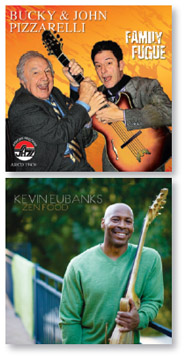
Where do you buy your music?
BP: I really don’t. It could be heard on a recording or a car radio. I like to learn songs by the composers, so I get one composer, learn four or five songs from that guy and then go to somebody else. That’s how I can remember them. I’ve never walked into a Best Buy.
KE: I get my music online. I don’t listen on vinyl, but maybe I should give a listen. I haven’t heard it in quite a while, and you never know.
What was the first instrument you played?
BP: I played the banjo briefly before I started to play the guitar. My uncle Joe, and Bobby Domenic from Paterson, every Sunday they played music in the house and I wanted to join in. I was nine years old. They showed me a few banjo chords, and later on they showed me a few chords on the guitar and that set me off. I learned how to play chords of songs. I picked up the guitar about the same time I picked up the banjo.
KE: Violin, from age seven to twelve.
What brought you to the instrument you now play?
BP: There are a lot of songs you can’t get your hands on with a six string guitar, so you have to finagle around and try it in different keys and get it all mixed up. George Van Eps and I were pioneers of the sevenstring because when you have a seventh string you have all the possible bass notes, and it’s like a piano. It is complete.
George developed it with the Gretsch guitar company in Brooklyn, and then came to New York to play all week at the Park Sheraton Hotel. I picked one up in 1969. In those days I was doing a lot of studio work so when we weren’t working we would stop and listen to him play, because he was playing all day. Every guitar player in New York would go down and listen to him because he was the master. I met him, and we talked, and I bought a guitar the next day. Gretsch had about six or seven guitars, and they sold them out the next day. Later Gretsch told me, “I’ll make anything you want.” He had so many gadgets on the seven-string I bought, I said, “There’s too many things on there. I just want one knob, one pickup, and that’s all.”
KE: I went to a James Brown concert at the Uptown Theater on Broad Street in Philadelphia—and when I left the concert I wanted to play guitar. To this day I cannot figure out what made me want to play guitar after a James Brown concert. You’d think I’d want to be a dancer or a singer or something, but I remember distinctively after the show I went outside and said, “I want to play guitar.” I remember telling my parents I want to stop playing violin, I want to play guitar, and they were like, Oh, here we go.
That was a traumatic childhood event, quitting the violin. My parents weren’t having that. I was pretty hard-headed as a child, I have since learned. They weren’t against me playing guitar, they were against me quitting violin. They were right, I shouldn’t have quit violin. I should have kept playing both.

My mother, of course, wanted me to take piano lessons and I, of course, didn’t—another mistake. I should have been a piano player. Of all the instruments that I love, I think piano comes most naturally to me. I just taught myself how to play. At my parents’ house, when I play piano, she just shakes her head and says, “You should have been a piano player. You never took a lesson and you sound like you play piano.” Of course that’s a mother’s love talking as well. I don’t think anyone wants to pay to hear me play piano.
I started playing trumpet because I thought my best chance of getting into college was to play a different instrument or classical guitar. I liked the trumpet for some reason. I was pretty good at playing instruments and I thought any instrument I came across would come naturally to me. I started taking trumpet lessons in high school but I was terrible at it. After about two and a half years I thought, Wow, this is bad. I’m not going to get into college on this. I sucked. I didn’t quit the trumpet, the trumpet quit me. The trumpet was like, Do not take me out of the case. Give me away to someone.
Who would you like to write with that you haven’t?
BP: I’ve written some original compositions, and usually when I made an album I always put something on it that I wrote, but I never got into writing with anyone else. I know the gymnastics you have to go through to get that sound. It’s a long process and I’d rather spend more time practicing, playing the guitar than trying to write a melody.
KE: I mostly compose by myself. I just started writing with a singer/songwriter named Janis Ian. I grew up listening to a lot of her music as a matter of fact. Janis and I just naturally have a really good feeling, so we’re going to be writing more together. I’ve tried writing with other people and sometimes it clicks and sometimes it doesn’t.
I’m sold as a jazz guitar player, but that’s really not the case. Janis understands that I like a lot of different types of music, music that people wouldn’t associate with me. She’s very versatile, so we just write music together how it comes out and we’re getting better and better writing together.
Take 6 has such a deep harmonic understanding that I would like to write and work with them; it would be beautiful with acoustic guitar and Take 6. That’s a record that I would cherish the opportunity of doing.
What musician influenced you most?
BP: I’d say George Barnes, from Chicago, Les Paul, Charlie Christian and George Van Eps.
KE: My mother. In addition to playing gospel music and church music, she has a Master’s degree in music education, so she studied lots and lots of classical piano. My earliest memories of music besides what’s on the radio was her teaching Bach two-part inventions, Mendelssohn and Chopin, things like that, every Saturday morning. When I got old enough to look at the music and look at Bach, I had already heard it so much that in my mind it was just another song. She would take us to rehearsals at church three days a week because she didn’t want to leave us with a babysitter. I’d fall asleep in her lap while she’s hitting the pedals on a Hammond organ. Growing up with a mother who was, and still is, a musician; the musician that I lived with every day, influenced me more than any other.
What was the song or event that made you realize you wanted to be in music?
BP: I sort of evolved into it. I did some good gigs in New York, started off playing with a big band, with Vaughn Monroe in 1943, when I was still going to high school. Frank Ryerson called me and said, “We need a guitar player for Vaughn Monroe’s band. You want to go to Scranton, Pennsylvania and Rochester?” Three one nighters. I was on Christmas vacation and I was able to do it. It was very exciting; you jump on a bus and see every city when you’re still in high school. I went back to high school the following Monday and graduated about two weeks later.
Vaughn asked me to stay with the band, and he had a radio show, coast to coast, every Saturday for five years, so I got an education. I met everybody in the business, the best arrangers, including Don Costa, who wrote for Sinatra later on. He was on a bus with us, and that’s where you learn. You say, “Which chord should I use here?” and he says, “Use a G7” and it works better than something else. Everything was adding to my knowledge of the guitar.
When the band broke up I said to myself, This is the end of me. I was in New York, walking in midtown, and I met this cello player, Brownie, who said, “Hey, Bucky. How you doing? Why don’t you go up to NBC and see Roy Shields, he’s the contractor. They’re looking for a guitar player to play The Kate Smith Show. Tell them I sent you.”
So the guy hired me. He didn’t even need to hear me play, on Brownie’s say-so. I did it for her last year on television, about five days a week. That’s how I started on TV.
KE: That day never happened for me. It was just what I did and I never stopped doing it. I grew up in a family that just played music, so I never thought there was a difference between making a living and playing music. That question never came to my mind about doing it because that’s all I had dreams about. I never had to think about whether I was going to go into music or what that meant. I never thought about making any money playing music. I was just this naïve kid that loved playing music. That was it.
I attended Berklee, but never graduated. My parents said, “Kev, you went to school for three and a half semesters. You couldn’t finish your last semester at school? Tell us you’re not serious.” There was a list at home. You quit violin. You quit trumpet. You’re leaving school? Do we have a loser on our hands? Do we have a quitter on our hands? Please don’t tell us you’re going. That was one more nail in the coffin.
I quit because I was just working too much. I’ve been on the road, been touring around Europe, I’ve been everywhere and I can’t concentrate on school. I come back to the classroom and I can’t focus because I’m just so happy I am going on another tour.
Leaving was a mistake, but also I wish I’d taken conducting class and string writing, because I wouldn’t have to do it now. I was just hard-headed. Once again, my master plan in action: Let’s quit all the things that you’ll wish you had done later.
I’ve heard it said that the best musicians don’t graduate from Berklee, they drop out because they’re gigging too much.
KE: I need that written on a big card to show my parents.
Who would you like in your ideal band?
BP: Well it’s all of course what you have to play for, you know, what the situation is. The guitar is lost in the big band, even though the most important thing with playing guitar in a big band is the rhythm playing, which no one knows how to do too well.
I like to play with just two guitars. I’d first start with my son. Last week I worked with Howard Alden and Jack Wilkins and we never rehearsed anything. We went in and played a beautiful set for an hour and half at Scullers in Boston. I can’t pick one guy. My favorite vocalist is Jo Stafford. I liked Peggy Lee, Rosemary Clooney and Margaret Whiting.
KE: I have the ideal band right now. Bill Pierce on tenor saxophone. Marvin (Smitty) Smith. Rene Camacho, a bass player I met through Smitty. So we’ve got four pieces and I just love this group. Besides, we’re on the road for three or four weeks and if they were ever to read that I said in a magazine that my ideal band does not include the band I’m playing with…they’re like, Kev, I just read this article in this magazine and oh, really? So Elvin Jones couldn’t make the gig, is that what it is? John Bonham isn’t available, huh? I do the best I can, but I’m not Coltrane, I guess he was booked.
I’m just getting silly. There are people I’ve always wanted to play with, that might be more realistic, but if I called them and said, I got a tour coming up, Oscar Peterson would say, Kevin who? I’d have to say, You know, the fellow on TV….
So here’s the band: I’ve always wanted to play with Oscar Peterson, but never played with him. I did play one week with Jimmy Smith, I don’t know if that counts. John Bonham [drums] from Led Zeppelin. Terry Kath, the guitar player from Chicago, on guitar, Oscar Peterson is on piano, Jimmy Smith is on organ, and the vocalists would have to be James Brown and Aretha Franklin. Killer band, we’re jamming. On trumpet, Miles would just break the whole band up…we can’t have Miles. I’ll take Freddie Hubbard on trumpet and J.J. Johnson on trombone. There’s a deep pool on saxophone, I’ll take ‘Trane. I guess that’s my band. I can’t use Ray Brown on bass ’cause then Oscar Peterson would take the whole band over. I’m going to take Willie Weeks on bass. Of course there’s no room for me, but I’ll just announce the band. Maybe I could trade off with Terry.
What’s your desert island CD?
BP: I’d like to hear George Van Eps play. He is not known like Miles Davis, but I’d rather listen to George Van Eps than Miles Davis.
KE: I wouldn’t need a CD. I would just listen to the ocean. You ever really listen to the ocean? You start to hear more things in the ocean than you could possibly imagine. You hear symphonies in the ocean. You hear the dynamics. You hear when a big wave comes because the lows resonate more. You can tell when a wave is crashing because all the highs come out. When it’s calm, all you hear is the lapping of the waves, just slapping against things. Depending on the time of day, if the birds are hunting, you hear more birds, less birds, the whole dynamic range of things when you listen to the ocean and then you start hearing other things. I wouldn’t need anything else. ![]()


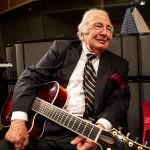
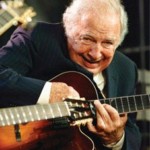
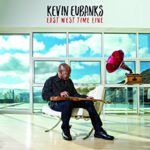
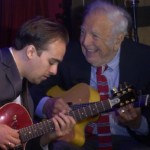

[…] And a bonus link to a great article on Bucky (and Kevin Eubanks) in Elmore Magazine […]